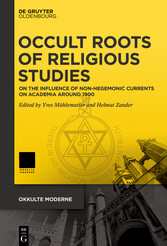Suchen und Finden
Service

Occult Roots of Religious Studies - On the Influence of Non-Hegemonic Currents on Academia around 1900
Yves Mühlematter, Helmut Zander
Verlag De Gruyter Oldenbourg, 2021
ISBN 9783110664270 , 295 Seiten
Format PDF
Kopierschutz Wasserzeichen
Geräte
Mehr zum Inhalt

Occult Roots of Religious Studies - On the Influence of Non-Hegemonic Currents on Academia around 1900
The historiographers of religious studies have written the history of this discipline primarily as a rationalization of ideological, most prominently theological and phenomenological ideas: first through the establishment of comparative, philological and sociological methods and secondly through the demand for intentional neutrality. This interpretation caused important roots in occult-esoteric traditions to be repressed.
This process of 'purification' (Latour) is not to be equated with the origin of the academic studies. De facto, the elimination of idealistic theories took time and only happened later. One example concerning the early entanglement is Tibetology, where many researchers and respected chair holders were influenced by theosophical ideas or were even members of the Theosophical Society. Similarly, the emergence of comparatistics cannot be understood without taking into account perennialist ideas of esoteric provenance, which hold that all religions have a common origin.
In this perspective, it is not only the history of religious studies which must be revisited, but also the partial shaping of religious studies by these traditions, insofar as it saw itself as a counter-model to occult ideas.
Yves Mühlematter, Helmut Zander, University of Fribourg, Freiburg, Switzerland
Shop

